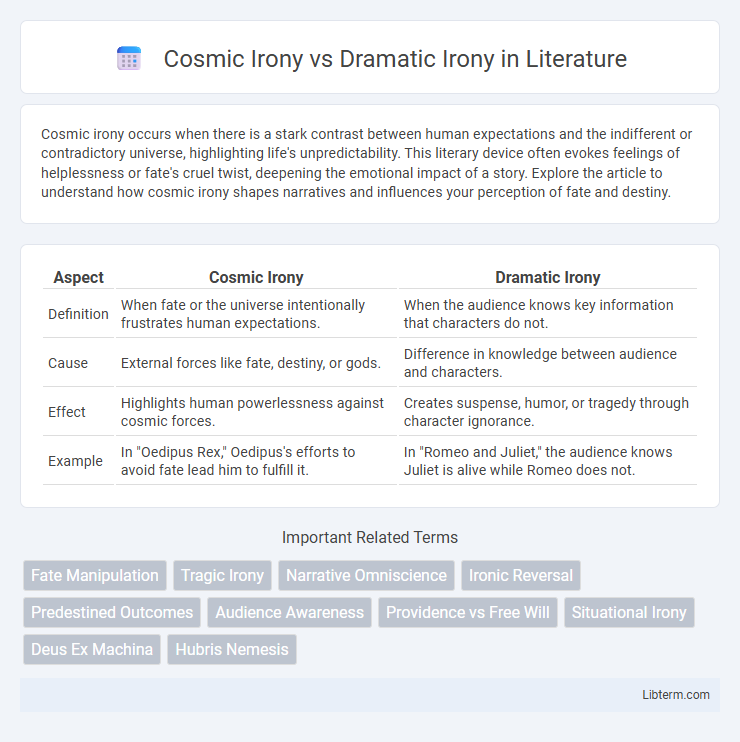Cosmic irony occurs when there is a stark contrast between human expectations and the indifferent or contradictory universe, highlighting life's unpredictability. This literary device often evokes feelings of helplessness or fate's cruel twist, deepening the emotional impact of a story. Explore the article to understand how cosmic irony shapes narratives and influences your perception of fate and destiny.
Table of Comparison
| Aspect | Cosmic Irony | Dramatic Irony |
|---|---|---|
| Definition | When fate or the universe intentionally frustrates human expectations. | When the audience knows key information that characters do not. |
| Cause | External forces like fate, destiny, or gods. | Difference in knowledge between audience and characters. |
| Effect | Highlights human powerlessness against cosmic forces. | Creates suspense, humor, or tragedy through character ignorance. |
| Example | In "Oedipus Rex," Oedipus's efforts to avoid fate lead him to fulfill it. | In "Romeo and Juliet," the audience knows Juliet is alive while Romeo does not. |
Introduction to Irony in Literature
Irony in literature is a powerful device that creates contrast between appearance and reality, enhancing thematic depth and emotional impact. Cosmic irony involves the universe or fate manipulating events to frustrate human desires, emphasizing the insignificance of individuals against larger forces. Dramatic irony occurs when the audience possesses knowledge unknown to the characters, generating tension and anticipation as characters act contrary to the true situation.
Defining Cosmic Irony
Cosmic irony occurs when fate, destiny, or a supernatural force manipulates events to create outcomes that contradict human intentions or expectations, highlighting the insignificance of human efforts against the universe. This form of irony often manifests in literature where characters' actions are rendered futile by an indifferent or hostile cosmos, emphasizing a universe that is uncaring or oblivious to human desires. Unlike dramatic irony, which relies on the audience's awareness of a character's ignorance, cosmic irony underscores a broader existential conflict between humans and uncontrollable external forces.
Understanding Dramatic Irony
Dramatic irony occurs when the audience possesses knowledge that characters in the narrative lack, creating tension and engagement as viewers anticipate the characters' reactions to unfolding events. This type of irony deepens the emotional impact of the story by highlighting characters' misunderstandings or false assumptions, often leading to pivotal plot twists. Recognizing the distinct role of dramatic irony enhances appreciation of storytelling techniques that manipulate audience awareness versus character insight.
Key Differences Between Cosmic and Dramatic Irony
Cosmic irony occurs when fate or a higher power manipulates events to cruelly twist the outcome against the protagonist, highlighting human helplessness, while dramatic irony arises when the audience knows critical information that the characters do not, creating tension and anticipation. Cosmic irony often emphasizes themes of destiny and existential despair, whereas dramatic irony focuses on character ignorance and the disparity between appearance and reality. Key differences include the source of irony--external cosmic forces versus audience insight--and the emotional effect, with cosmic irony inducing fatalism and dramatic irony generating suspense.
Examples of Cosmic Irony in Classic Works
Cosmic irony often appears in classic literature where fate or the universe manipulates events against a protagonist's desires, such as in Sophocles' "Oedipus Rex," where Oedipus unknowingly fulfills a tragic prophecy despite his efforts to avoid it. In Thomas Hardy's "Tess of the d'Urbervilles," Tess suffers dire consequences from forces beyond her control, highlighting the indifferent cruelty of fate. These examples emphasize cosmic irony by showcasing humans' powerlessness against predetermined destiny, contrasting with dramatic irony where the audience knows more than the characters.
Famous Uses of Dramatic Irony
Dramatic irony occurs when the audience knows critical information that the characters do not, heightening tension and emotional impact. Famous uses include Shakespeare's "Romeo and Juliet," where the audience knows Juliet is alive while Romeo believes she is dead, leading to the tragic conclusion. Another notable example is Sophocles' "Oedipus Rex," where the audience is aware of Oedipus's true identity long before he discovers it himself.
The Role of Fate and the Universe in Cosmic Irony
Cosmic irony emphasizes the role of fate and the universe as indifferent or even antagonistic forces shaping human destiny, often highlighting the discrepancy between human expectations and an uncaring cosmos. Unlike dramatic irony, where the audience has knowledge unknown to the characters, cosmic irony involves a larger existential context where outcomes subvert hopes through the whims of fate or cosmic order. This form of irony reflects the philosophical theme of humans struggling against predetermined or chaotic forces beyond their control.
Reader Engagement through Dramatic Irony
Dramatic irony heightens reader engagement by creating a tension between what characters know and what the audience understands, fostering anticipation and emotional investment in the narrative. This literary device encourages readers to actively interpret events and predict outcomes, enhancing their connection to the story. In contrast, cosmic irony emphasizes fate or the universe's indifference, which evokes reflection rather than immediate suspense or involvement.
Impact on Theme and Storytelling
Cosmic irony intensifies themes of fate, destiny, and human vulnerability by highlighting the universe's indifferent or malevolent forces, deepening the story's existential tension. Dramatic irony creates suspense and engages the audience by revealing critical information unknown to the characters, emphasizing themes of deception, misunderstanding, and inevitability. Both forms of irony shape storytelling by influencing audience perception and emotional investment, with cosmic irony underscoring overarching thematic messages and dramatic irony driving plot dynamics and character development.
Choosing the Right Irony for Your Narrative
Cosmic irony involves fate or a higher power manipulating events, creating a contrast between characters' desires and outcomes, while dramatic irony occurs when the audience knows something critical that the characters do not. Choosing the right irony enhances thematic depth; cosmic irony suits narratives exploring existential themes and inevitability, whereas dramatic irony intensifies tension and engagement through audience insight. Writers should evaluate their story's tone and purpose to effectively integrate the irony that best supports character development and plot progression.
Cosmic Irony Infographic

 libterm.com
libterm.com